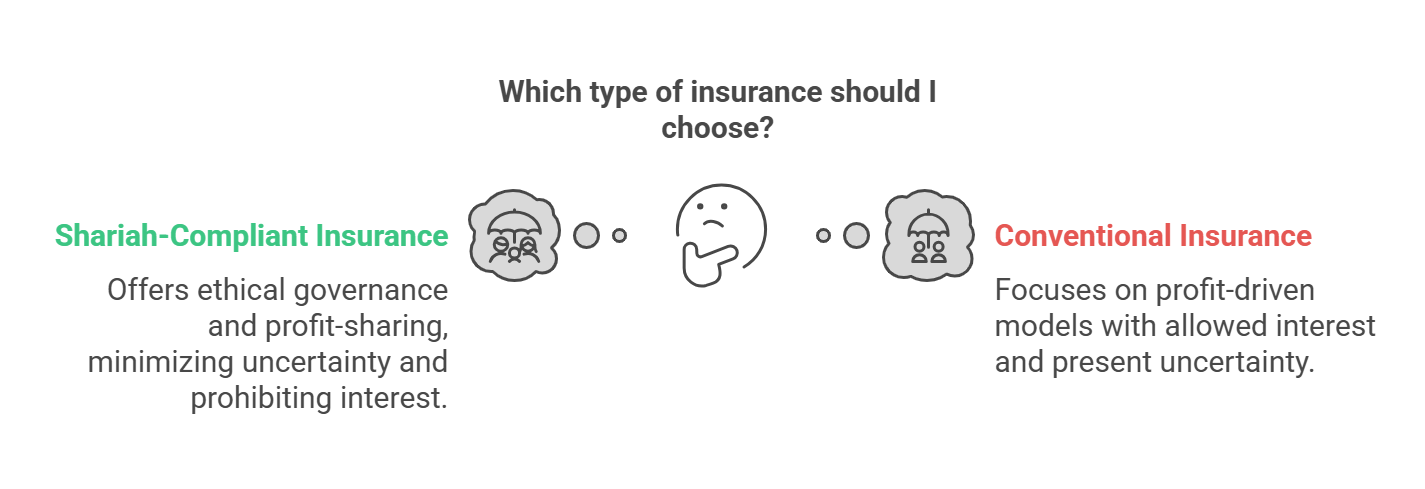Shariah-Compliant Insurance: A Halal Alternative to Protect Your Family and Assets

In today’s world, insurance is a necessity for safeguarding your family, health, and assets. But for Muslims and ethically conscious individuals, conventional insurance often conflicts with their values due to elements like interest (Riba) and uncertainty (Gharar). Enter Shariah-compliant insurance, also known as Takaful—a halal alternative that aligns with Islamic principles while providing financial protection.
This comprehensive guide will explore everything you need to know about Shariah-compliant insurance, from its principles and benefits to how it compares to conventional insurance. Whether you’re new to Takaful or looking to deepen your understanding, this article will equip you with the knowledge to make informed decisions.
What is Shariah-Compliant Insurance?
Understanding the Basics of Shariah-Compliant Insurance
Shariah-compliant insurance, or Takaful, is a form of Islamic insurance based on the principles of mutual cooperation, shared responsibility, and ethical financial practices. Unlike conventional insurance, which often involves elements prohibited in Islam (such as Riba and Gharar), Takaful operates in a way that complies with Shariah law.
Key features of Takaful include:
- Risk-sharing: Participants contribute to a pooled fund to help each other in times of need.
- No interest (Riba): Investments are made in halal, interest-free ventures.
- Transparency: Operations are overseen by a Shariah Supervisory Board to ensure compliance.

The Principles of Shariah Compliance in Insurance
Shariah-compliant insurance is built on three core Islamic principles:
-
Prohibition of Riba (Interest):
Conventional insurance often involves interest-based transactions, which are forbidden in Islam. Takaful avoids this by using profit-sharing models. -
Avoidance of Gharar (Uncertainty):
Takaful eliminates ambiguity by clearly defining contributions, risks, and benefits. -
Mutual Cooperation (Ta’awun):
Participants pool their resources to support one another, embodying the Islamic value of community welfare.
| Aspect | Shariah-Compliant Insurance (Takaful) | Conventional Insurance |
|---|---|---|
| Interest (Riba) | Prohibited | Allowed |
| Uncertainty (Gharar) | Minimized | Present |
| Profit Model | Profit-sharing | Profit-driven |
| Governance | Shariah Supervisory Board | No religious oversight |

How Does Shariah-Compliant Insurance Work?
The Takaful Model Explained
Takaful operates on a unique model where participants contribute to a shared fund. This fund is used to cover claims, and any surplus is distributed among participants or reinvested in halal ventures.
Key components of the Takaful model:
- Participants: Individuals who contribute to the fund.
- Takaful Operator: Manages the fund and ensures compliance with Shariah principles.
- Surplus Distribution: Profits are shared among participants or donated to charity.
Types of Shariah-Compliant Insurance
Takaful offers a range of products to meet diverse needs:
-
Family Takaful (Life Insurance):
Provides financial protection for families in case of death, disability, or critical illness. -
General Takaful:
Covers assets like homes, vehicles, and businesses against loss or damage. -
Micro-Takaful:
Affordable insurance solutions for low-income individuals, promoting financial inclusion.

Benefits of Shariah-Compliant Insurance
Why Choose Shariah-Compliant Insurance?
- Ethical and Halal: Complies with Shariah principles, ensuring your investments are halal.
- Transparency: Operations are overseen by a Shariah Supervisory Board, ensuring fairness.
- Community Focus: Emphasizes mutual cooperation and shared responsibility.
Global Growth of Shariah-Compliant Insurance
The Takaful industry is booming, with the GCC region leading the way. According to a report by S&P Global, the sector is expected to grow by 10% annually, driven by increasing awareness and demand for ethical financial products.
Challenges and Misconceptions About Shariah-Compliant Insurance
Common Misconceptions About Takaful
-
Myth: Takaful is only for Muslims.
Fact: Anyone can benefit from its ethical and transparent model. -
Myth: Takaful is more expensive than conventional insurance.
Fact: Pricing depends on the plan and provider, and many find it competitive.
Challenges Facing the Takaful Industry
- Regulatory Hurdles: Varying regulations across countries can complicate operations.
- Lack of Awareness: Many people are unaware of Takaful and its benefits.
- Competition: Conventional insurers dominate the market, making it harder for Takaful to gain traction.

Shariah-Compliant Insurance in Practice
Case Studies of Successful Takaful Models
- Prudential PLC: Offers Takaful products in multiple countries, blending Islamic principles with modern financial solutions. (Source)
- UNDP’s Takaful Initiatives: Provides financial resilience to over 100 million people through micro-Takaful. (Source)
How to Choose the Right Shariah-Compliant Insurance Plan
- Check Certification: Ensure the provider is certified by a Shariah Supervisory Board.
- Compare Coverage: Look for plans that meet your specific needs.
- Read Reviews: Research the provider’s reputation and customer feedback.
| Factor | What to Look For |
|---|---|
| Shariah Certification | Verified by a reputable board |
| Coverage | Meets your specific needs |
| Pricing | Competitive and transparent |
| Customer Reviews | Positive feedback and high ratings |
Shariah-compliant insurance is more than just a financial product—it’s a commitment to ethical and halal practices. Whether you’re looking to protect your family, safeguard your assets, or invest in a socially responsible way, Takaful offers a viable alternative to conventional insurance.
Call-to-Action: Explore Takaful options today and secure financial protection that aligns with your values.


Responses